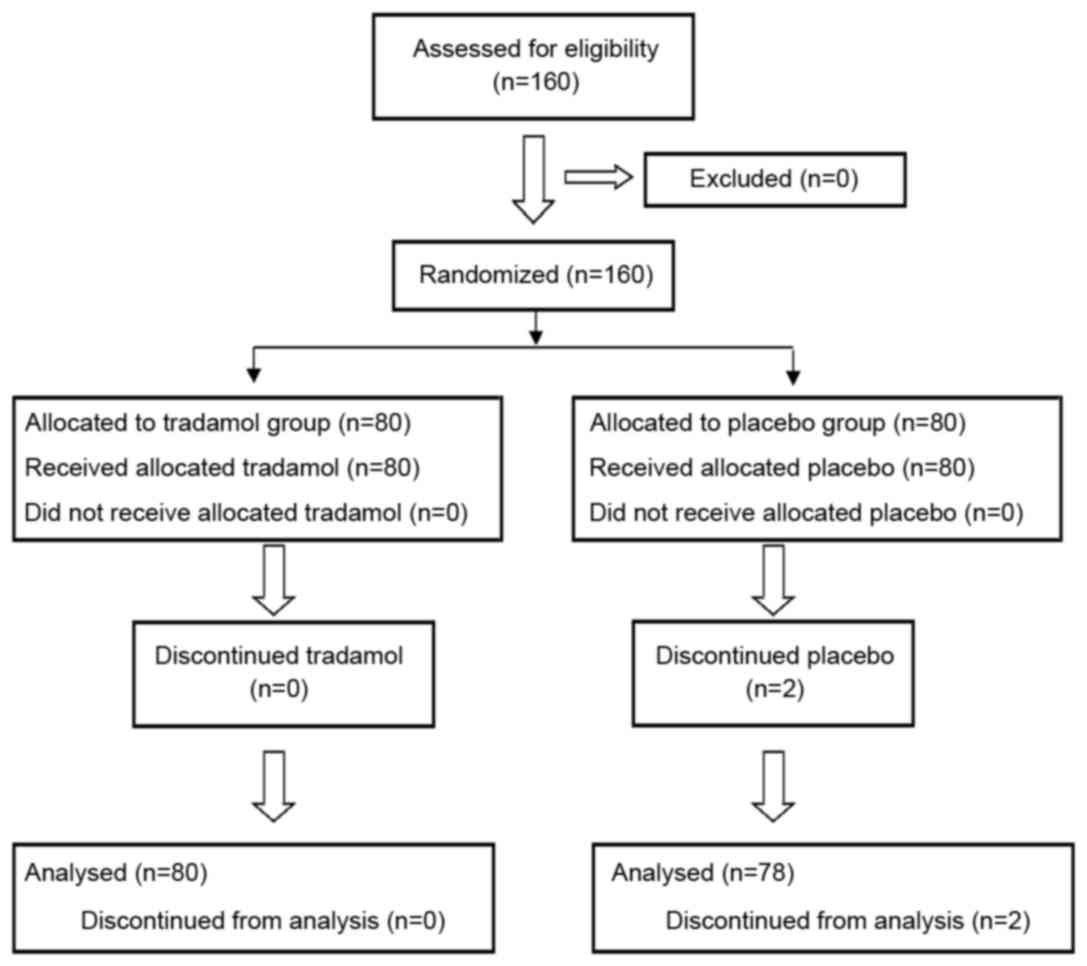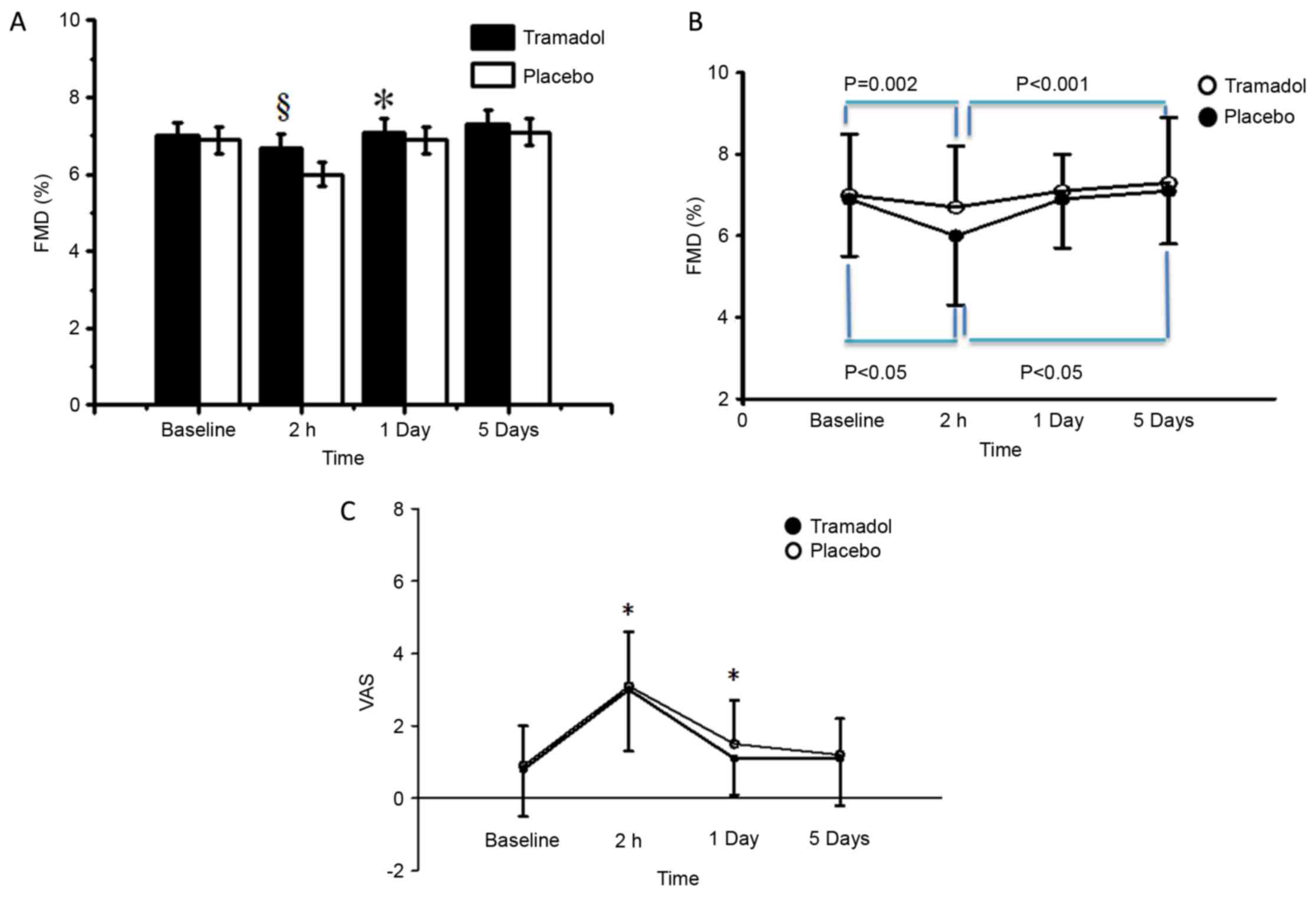|
1
|
Khan J, Alonso-Coello P and Devereaux PJ:
Myocardial injury after noncardiac surgery. Curr Opin Cardiol.
29:307–311. 2014. View Article : Google Scholar : PubMed/NCBI
|
|
2
|
McIlroy DR, Chan MT, Wallace SK, Symons
JA, Koo EG, Chu LC and Myles PS: Automated preoperative assessment
of endothelial dysfunction and risk stratification for
perioperative myocardial injury in patients undergoing non-cardiac
surgery. Br J Anaesth. 112:47–56. 2014. View Article : Google Scholar : PubMed/NCBI
|
|
3
|
Deveraux PJ, Goldman L, Cook DJ, Gilbert
K, Leslie K and Guyatt GH: Perioperative cardiac events in patients
undergoing non-cardiac surgery: A review of the magnitude of the
problem, the pathophysiology of the events and methods to estimate
and communicate risk. CMAJ. 173:627–634. 2005. View Article : Google Scholar : PubMed/NCBI
|
|
4
|
Søndergaard ES, Fonnes S and Gögenur I:
Endothelial dysfunction after non-cardiac surgery: A systematic
review. Acta Anaesthesiol Scand. 59:140–146. 2015. View Article : Google Scholar : PubMed/NCBI
|
|
5
|
Kwok T, Chook P, Tam L, Qiao M, Woo JLF,
Celermajer DS and Woo KS: Vascular dysfunction in Chinese
vegetarians: an apparent paradox. J Am Coll Cardiol. 46:1957–1958.
2005. View Article : Google Scholar : PubMed/NCBI
|
|
6
|
Fuster V, Badimon L, Badimon JJ and
Chesebro JH: The pathogenesis of coronary artery disease and the
acute coronary syndromes (2). N Engl J Med. 326:310–318. 1992.
View Article : Google Scholar : PubMed/NCBI
|
|
7
|
Suwaidi JA, Hamasaki S, Higano ST,
Nishimura RA, Holmes DR Jr and Lerman A: Long-term follow-up of
patients with mild coronary artery disease and endothelial
dysfunction. Circulation. 101:948–954. 2000. View Article : Google Scholar : PubMed/NCBI
|
|
8
|
Schachinger V, Britten MB and Zeiher AM:
Prognostic impact of coronary vasodilator dysfunction on adverse
long-term outcome of coronary heart disease. Circulation.
101:1899–1906. 2000. View Article : Google Scholar : PubMed/NCBI
|
|
9
|
Gokce N, Keaney JF Jr, Hunter LM, Watkins
MT, Menzoian JO and Vita JA: Risk stratification for postoperative
cardiovascular events via noninvasive assessment of endothelial
function: A prospective study. Circulation. 105:1567–1572. 2002.
View Article : Google Scholar : PubMed/NCBI
|
|
10
|
Gokce N, Keaney JF Jr, Hunter LM, Watkins
MT, Nedeljkovic ZS, Menzoian JO and Vita JA: Predictive value of
noninvasively determined endothelial dysfunction for long-term
cardiovascular events inpatients with peripheral vascular disease.
J Am Coll Cardiol. 41:1769–1775. 2003. View Article : Google Scholar : PubMed/NCBI
|
|
11
|
Hu YJ, Wei AN, Chook P, Yin Y, Cheng W, Wu
MJ, Celermajer DS and Woo KS: Impact of on-cardiovascular surgery
on reactive hyperaemia and arterial endothelial function. Clin Exp
Pharmacol Physiol. 40:466–472. 2013. View Article : Google Scholar : PubMed/NCBI
|
|
12
|
Drenger B, Fontes ML, Miao Y, Mathew JP,
Gozal Y, Aronson S, Dietzel C and Mangano DT: Investigators of the
Ischemia Research and Education Foundation; Multicenter Study of
Perioperative Ischemia Research Group: Patterns of use of
perioperative angiotensin-converting enzyme inhibitors in coronary
artery bypass graft surgery with cardiopulmonary bypass: Effects on
in-hospital morbidity and mortality. Circulation. 126:261–269.
2012. View Article : Google Scholar : PubMed/NCBI
|
|
13
|
Mangano DT, Siliciano D, Hollenberg M,
Leung JM, Browner WS, Goehner P, Merrick S and Verrier E:
Postoperative myocardial ischemia. Therapeutic trials using
intensive analgesia following surgery. The Study of Perioperative
Ischemia (SPI) Research Group. Anesthesiology. 76:342–353. 1992.
View Article : Google Scholar : PubMed/NCBI
|
|
14
|
Wink J, Veering BT, Aarts LP and Wouters
PF: Effect of increasing age on the haemodynamic response to
thoracic epidural anaesthesia: An observational study. Eur J
Anaesthesiol. 31:597–605. 2014. View Article : Google Scholar : PubMed/NCBI
|
|
15
|
Guo W, Liu F, Fu L, Qu R, Wang G and Zhang
C: Effects of high thoracic epidural sympathetic blockade for the
treatment of severe chronic heart failure due to dilated
cardiomyopathy. Acta Cardiol. 67:533–539. 2012. View Article : Google Scholar : PubMed/NCBI
|
|
16
|
Kim JY, Park SY, Chang HS, Nam SK and Min
SK: The efficacy of the time-scheduled decremental continuous
infusion of fentanyl for postoperative patient-controlled analgesia
after total intravenous anesthesia. Korean J Anesthesiol.
65:544–551. 2013. View Article : Google Scholar : PubMed/NCBI
|
|
17
|
de Boer AG, van Lanschot JJ, Stalmeier PF,
van Sandick JW, Hulscher JB, de Haes JC and Sprangers MA: Is a
single-item visual analogue scale as valid, reliable and responsive
as multi-item scales in measuring quality of life? Qual Life Res.
13:311–320. 2004. View Article : Google Scholar : PubMed/NCBI
|
|
18
|
Bukal K, Ruzić A, Bazdarić K, Sokolić J,
Vukić-Dugac A, Velcić-Brumnjak S, Sestan B, Gulan JR and Gulan G:
Total knee replacement surgery is followed by transitory
endothelial dysfunction. Coll Antropol. 36:611–616. 2012.PubMed/NCBI
|
|
19
|
Park JK, Cheong SH, Lee KM, Lim SH, Lee
JH, Cho K, Kim MH and Kim HT: Does dexmedetomidine reduce
postoperative pain after laparoscopic cholecystectomy with
multimodal analgesia? Korean J Anesthesiol. 63:436–440. 2012.
View Article : Google Scholar : PubMed/NCBI
|
|
20
|
Jabbour-Khoury SI, Dabbous AS, Gerges FJ,
Azar MS, Ayoub CM and Khoury GS: Intraperitoneal and intravenous
routes for pain relief in laparoscopic cholecystectomy. JSLS.
9:316–321. 2005.PubMed/NCBI
|
|
21
|
Celermajer DS, Sorensen KE, Georgakopoulos
D, Bull C, Thomas O, Robinson J and Deanfield JE: Cigarette smoking
is associated with dose-related and potentially reversible
impairment of endothelium-dependent dilation in healthy young
adults. Circulation. 88:2149–2155. 1993. View Article : Google Scholar : PubMed/NCBI
|
|
22
|
Woo KS, Yip TW, Chook P, Kwong SK, Szeto
CC, Li JK, Yu AW, Cheng WK, Chan TY, Fung KP and Leung PC:
Cardiovascular Protective Effects of Adjunctive Alternative
Medicine (Salvia miltiorrhiza and Pueraria lobata) in High-Risk
Hypertension. Evid Based Complement Alternat Med. 2013:1329122013.
View Article : Google Scholar : PubMed/NCBI
|
|
23
|
Woo KS, Chook P, Leong HC, Huang XS and
Celermajer DS: The impact of heavy passive smoking on arterial
endothelial function in modernized Chinese. J Am Coll Cardiol.
36:1228–1232. 2000. View Article : Google Scholar : PubMed/NCBI
|
|
24
|
Kocak H, Ceken K, Yavuz A, Yucel S, Gurkan
A, Erdogan O, Ersoy F, Yakupoglu G, Demirbas A and Tuncer M: Effect
of renal transplantation on endothelial function in haemodialysis
patients. Nephrol Dial Transplant. 21:203–207. 2006. View Article : Google Scholar : PubMed/NCBI
|
|
25
|
Unal O, Karatepe O, Ugurlucan M, Koc B,
Filizcan U and Aksoy M: Effects of lower extremity
revascularization on the endothelial functions measured with
noninvasive brachial artery flow-mediated dilatation. Ann Vasc
Surg. 25:969–974. 2011. View Article : Google Scholar : PubMed/NCBI
|
|
26
|
Fleischmann KE, Goldman L, Young B and Lee
TH: Association between cardiac and noncardiac complication in
patients undergoing noncardiac surgery. Outcomes and effects on
length of stay. Am J Med. 115:515–520. 2003. View Article : Google Scholar : PubMed/NCBI
|
|
27
|
Bhagat K and Vallance P: Inflammatory
cytokines impair endothelium-dependent dilatation in human veins in
vivo. Circulation. 96:3042–3047. 1997. View Article : Google Scholar : PubMed/NCBI
|
|
28
|
Chia S, Qadan M, Newton R, Ludlam CA, Fox
KA and Newby DE: Intra-arterial tumor necrosis factor-alpha impairs
endothelium-dependent vasodilatation and stimulates local tissue
plasminogen activator release in humans. Arterioscler Thromb Vasc
Biol. 23:695–3701. 2003. View Article : Google Scholar : PubMed/NCBI
|
|
29
|
Erzen B, Sabovic M, Sebestjen M, Keber I
and Poredos P: Interleukin-6 correlates with endothelial
dysfunction in young post-myocardial infarction patients.
Cardiology. 107:111–116. 2007. View Article : Google Scholar : PubMed/NCBI
|
|
30
|
Roy S, Cain KJ, Chapin RB, Charboneau RG
and Barke RA: Morphine modulates NF kappa B activation in
macrophages. Biochem Biophys Res Commun. 245:392–396. 1998.
View Article : Google Scholar : PubMed/NCBI
|
















